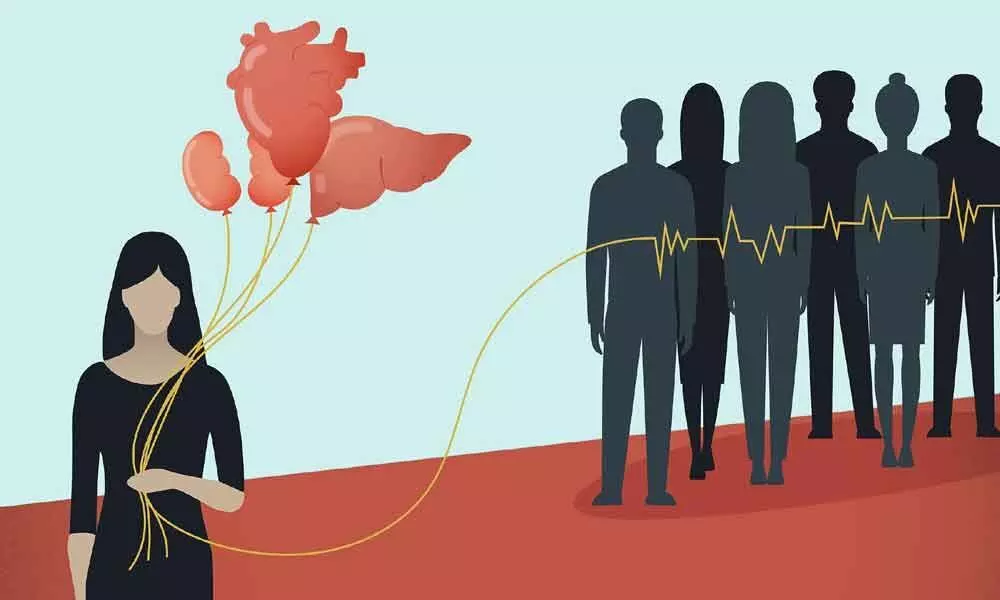Live
- Five-Year-Old Boy Dies After 55-Hour Rescue from Borewell in Rajasthan's Dausa
- Chaos in Parliament over Congress-George Soros link claims, BJP MP poses questions
- Bus Driver Arrested After Deadly Accident in Mumbai’s Kurla; 42 Injured
- Community lunch, a ritual to prevent drought in Adoni
- Rs 36.07 crore tribal products sold through TRIFED in FY24: Govt
- PM Modi to lay foundation stone for Ken-Betwa river linking project on Dec 25: MP CM
- 70 farmers trained as drone pilots in Anantapur dist
- AP Pensions: 500 Ineligible People Receive Pensions for Every 10,000
- South Korea's ruling party chief voices support for President Yoon's impeachment
- Defeat in Tirhut bypolls doesn't signify discontent among teachers: Bihar Education Minister
Just In
Jeevandha programme saw a dip in Organ donation in Hyderabad city


Jeevandan, the cadaver organ donation and transplantation programme of the Telangana government, saw a dip in organ donations for the first time since the its inception in 2013.
Hyderabad: Jeevandan, the cadaver organ donation and transplantation programme of the Telangana government, saw a dip in organ donations for the first time since the its inception in 2013.
There were 572 donations in 2018 while 430 in 2019. Speaking to The Hans India, Dr Swarnalatha, the in-charge of Jeevandan programme, attributes the slide in donations to the organ rackets that rocked the State in the last few years. She further said, "The capture of illegal organ mongers in various parts of the country makes people suspicious about the organ donation procedure."
In 2013, the number of donations was merely 188; then, it increased year by year and touched 564 in 2017. There were 572 donations in 2018, but the number slid to 430 in 2019. Till date, there have been 2,788 transplantations.
The organ donations would have been much more but for the low turnout from government hospitals. The KIMS hospital tops the list with 141, followed by 122 from Apollo Hospital. Whereas, the number of organ donations from NIMS and Osmania Hospital combined is merely 27.
Maximum number of patients including critical cases such as accidents arrive at government hospitals but the mechanism to convince the relatives for organ donation is still in fancy.
Dr Swarnalatha explained other hurdles in the programme. "Superstitions, mythical beliefs and unscientific claims are the major issues behind the hesitation of people for organ donation. Among Hindus, the prevalent disbelief is in the next life he/she would be born without that donated organ. The non-conformity among Islam for the altercations of the human body etc. significantly cripples this project". She quipped.
"However, three people from the Muslim community came forward for organ donation which is a welcome change. Khasim (45) from Khammam, donated - kidney, liver, heart on Oct 17, 2014, Mehabood Basha (25) from Kurnool donated kidneys, liver, heart on Oct 26, 2017 and Faruddin (65) from Anantapur donated kidneys and liver on Oct 27, 2017.
Even in Saudi Arabia and the UAE, organ transplantations are happening at a larger level" she added. The lack of awareness among people and even police to an extent to distinguish between brain dead and the cease of pumping of the heart was another major challenge for the Jeevandan team. For most people, the latter is considered as death. But transplantation has to be performed even before the termination of the heartbeat.
Convincing the relatives during this narrow window is a gargantuan task. "Sometimes the hospitals itself fail to identify the brain dead as the heart keeps functioning with the help of equipment. This also narrows down the availability of organ donors and transplantation" she explained.
The dearth of organs to fulfil the demand led to the thriving of organ rackets in the state. According to the available data, more than 5,000 are awaiting organ transplantation.
The strong regulations implemented by the state, against the commodification of the human organs, skyrockets the price of organs in the black market.
A manual of rules, regulations and policies to be followed has also been prepared as a roadmap for the coordinators. "Turning the donor into a hero and honouring his final act of altruism by attending his final rituals is also done by Jeevandan group. Such activities help in dismantling the inhibitions pertaining in the society against the most generous act of humanity". Swarnalatha, the woman at the helm briefed.

© 2024 Hyderabad Media House Limited/The Hans India. All rights reserved. Powered by hocalwire.com






